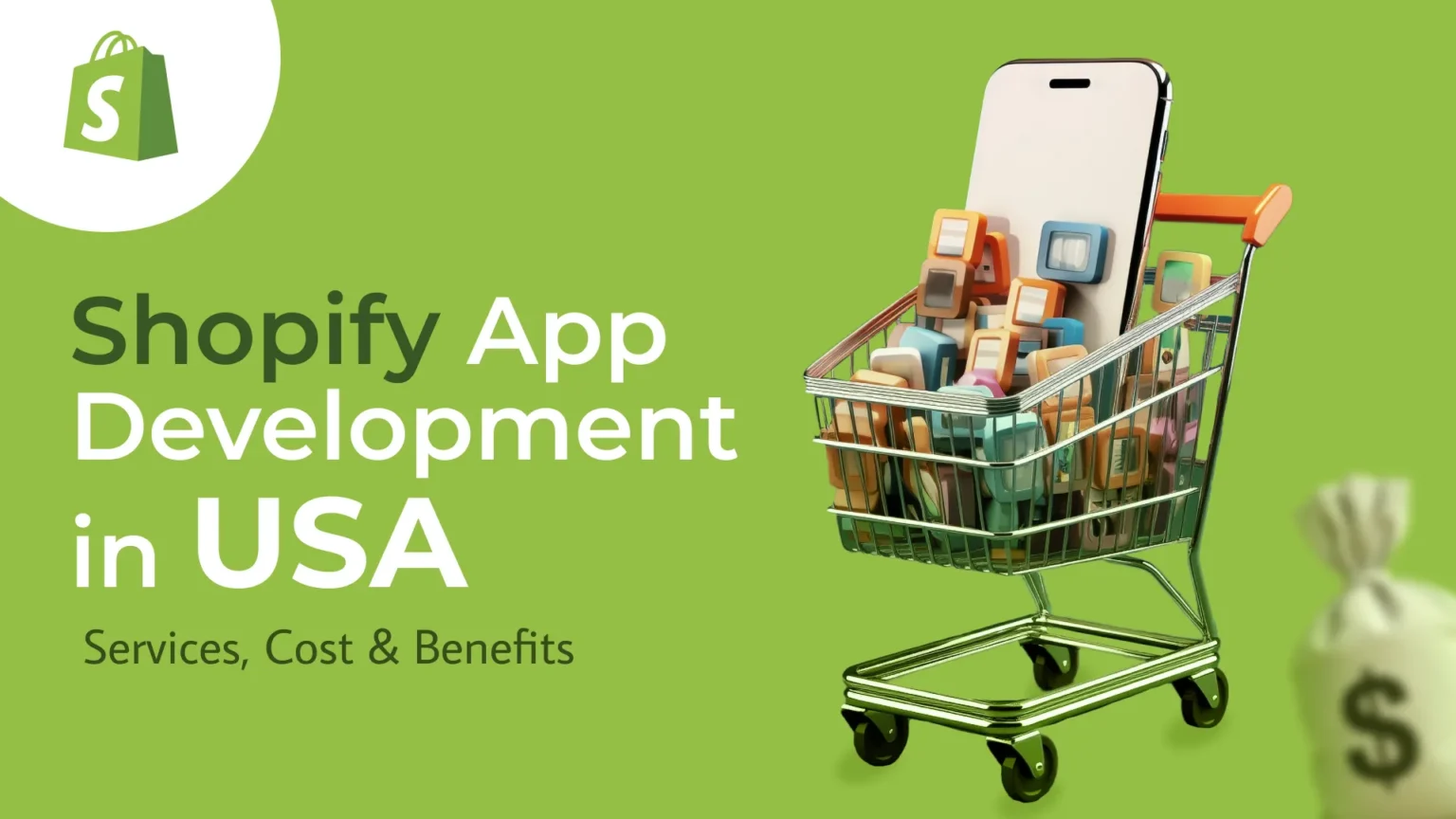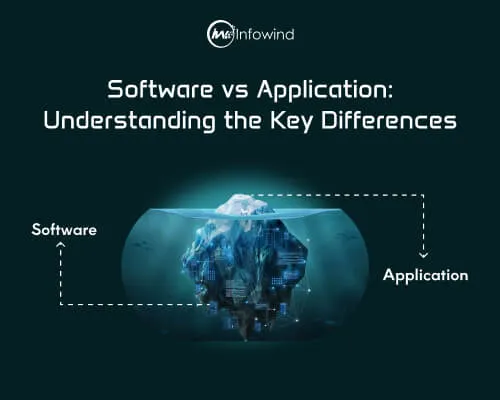The worldwide live websites using Shopify have reached 4.8 million and the USA holds the highest e-commerce platform market share at 66%. Shopify meets the needs of expanding businesses through its straightforward framework and inclusive product framework and has therefore emerged as the leading e-commerce platform option for scalability.
Shopify stores face an intense competitor landscape because approximately 80% of them suffer from poor management, weak customer relationships, and inadequate automation. The necessary functionality of Shopify apps proves essential in running an operation. These apps provide two essential benefits by improving both user experience and operation automation to help businesses succeed in competitive markets.
The following guide demonstrates all core Shopify app development services with costs and investment benefits for custom Shopify apps and essential strategies to hire developers targeting USA businesses. Companies at any scale can benefit from appropriate Shopify applications to discover new business expansion potential while defeating market competition.
Why Shopify Apps are Essential for E-commerce Success
Store fundamental features are available in Shopify, but to reach absolute store potential you must utilize Shopify apps. The USA’s business community depends on Shopify App Development in the USA to improve their functionality and operational automation as well as elevate their sales potential. The following reasons demonstrate why Shopify apps become essential for achieving success:
1. Enhancing Store Functionality and User Experience
The foundation of customer retention depends on how smoothly customers shop on your platform. Shopify apps help by:
- Customers will experience improved navigation because of the smart search technology, together with filtering capabilities.
- Enhancing customer support through chatbots and AI-driven FAQs.
- A perfect user experience exists through mobile responsiveness on various platforms.
2. Automating Business Operations
Traditional growth in e-commerce requires efficiency to function properly. Shopify apps streamline:
- The system controls inventory effectively, which assures both inventory depletion and excess stock are eliminated.
- Order processing through automation makes operations more efficient by lowering both human labor and shipment mistakes.
- Development tools under marketing automation enable better email automation, social media promotion, and targeted customer retargeting campaigns through automated strategies.
3. Customizing Shopify Beyond Built-in Features
- Every business has unique needs. Shopify apps allow:
- The conversion rate can be improved by implementing custom checkout processes through Shopify apps.
- Personalized product recommendations for higher engagement.
- Users can integrate their systems through third-party connections, which link CRMs and ERP solutions as well as analytics tools.
4. Improving conversion rates and sales performance
Apps enhance sales by:
- Online sales increase through the combination of exit-intent popups with automated follow-ups to decrease abandoned carts.
- Organizations can enhance sales results with AI-based systems that recommend additional related products to customers.
- Improving search rankings with optimizing speed by adjusting SEO and speed factors leads to better performance.
USA-based Shopify application development enables businesses to use advanced tools for boosting their sales performance alongside maintaining their competitive edge.
Types of Shopify Apps: Custom vs. Public Apps
The selection of appropriate applications stands vital for Shopify store expansion. Shops that implement Shopify App Development in the USA must learn about the diverse types of apps to achieve maximum operational efficiency.
1. Custom Shopify Apps
These apps function specifically for one retail outlet to handle its particular business requirements. These applications blend effortlessly into current systems to deliver customized solutions such as customized checkouts, advanced inventory functionality, and special payment systems. These solutions provide the best control framework for businesses that require sole proprietorship.
2. Public Shopify Apps
Online applications labeled as Shopify Apps can be found through the Shopify App Store and serve multiple types of merchants. Merchant platforms provide ready-to-use features for search engine optimization, email automation services, as well as customer reward systems. The convenience of these applications does not guarantee all businesses will find the extent of customization they need.
3. Private Shopify Apps
Private apps focus on internal business operations thus they do not appear on the Shopify App Store. Private Shopify Apps deliver secure, in-house solutions that businesses require primarily for specialized reporting tools, third-party integrations, and automated order processing systems.
4. Embedded Shopify Apps
The user interface of Shopify connects to these apps directly through single-platform integration which creates smooth customer use. The apps function inside the Shopify admin panel to deliver better accessibility and usability while skipping the need for external account logins.
Business decisions about e-commerce application types determine suitable solutions that promote operational efficiency along with system scalability and lasting business success.
Shopify App Development Services in the USA
Companies wanting to achieve growth in the e-commerce market need professional Shopify App Development services within the USA. Expert developers at these services help Shopify stores by providing three main services that range from creating personal solutions to performance enhancement.
1. Custom Shopify App Development
Off-the-shelf applications fall short of meeting the special requirements that each business possesses. Professional Shopify developers create customized applications that provide individualized checkout handling, together with automatic order processing functions along with artificial intelligence recommendations for products. Businesses separate themselves from the competition when they integrate apps containing features made for their organizational requirements.
2. API Integration & Third-Party Service Connections
Shopify apps perform most of their operations by interacting with external payment gateways as well as CRM systems ERP software and shipping providers. Integration through APIs establishes smooth data communication between Shopify and its third-party technology partners for enhancing business operational efficiency and automation.
3. Shopify App UI/UX Design
The interface design requires simplicity for users at both store management and customer levels. Applications developed by Shopify developers prioritize user-friendly navigation functions alongside mobile-friendly design and easy connections with Shopify’s core elements. The design quality of apps improves how the system functions which creates simpler processes during business activities.
4. Performance Optimization & Security
The essential characteristics of any Shopify app are performance speed while maintaining data security and developers implement optimized code with caching functions as well as secure authentication procedures to guarantee fast app loading and safeguard sensitive data. The performance speed of an app combined with its security level directly impacts revenue generation and company security.
5. Ongoing Maintenance & Support
Shopify apps need ongoing maintenance because the e-commerce environment is always changing their ability to function properly. The maintenance of business apps includes bug solutions as well as performance enhancements and continued support which allows essential updates for improved execution.
Companies in the USA achieve powerful high-performing apps by utilizing expert Shopify app development services which drive sales while improving efficiency and offering seamless shopping ability.
Cost of Shopify App Development in the USA
A business can improve efficiency and revenue with Shopify apps while their cost determination depends on various considerations. Knowledge of these factors enables businesses to handle budget planning successfully.
The final price of Shopify app development changes according to several decisive elements.
- App development expenses differ based on two key factors including the complexity of the functions integrated into basic features or advanced features which require more development resources.
- The cost difference exists between custom-developed and public applications since public apps on the Shopify App Store function for general purposes. The development of custom applications for particular business requirements tends to increase project time and expense levels.
- Development costs rise when adopting third-party services which enable Shopify to communicate with CRM systems and payment gateways and Enterprise Resource Planning solutions.
- Hiring US-based development teams for building applications will result in higher expenses because of their elevated local labor rates but offshore developers typically have lower costs though their communication quality and time zone differences and assurance in their work might be problematic.
Average Price Range for Shopify App Development
- Basic Shopify App: $5,000 – $15,000 (simple functionalities like loyalty programs, pop-ups, or product reviews)
- The price range for developing mid-range customized applications is between $15,000 and $50,000 with advanced features such as AI chatbots, subscription management, and custom checkout processes.
- Enterprise-Level App: $50,000+ (highly complex apps with deep integrations, automation, and scalability for large businesses)
Additional Costs to Consider
- Maintenance & Updates: Ongoing support, security patches, and feature enhancements.
- Shopify imposes commission charges to its users who launch public apps through its platform.
The evaluation of these cost elements enables businesses to select Shopify App Development solutions in the USA optimally for their budget purposes.
How to Choose the Right Shopify App Development Company in the USA
Choosing an experienced development partner stands as the most vital step for creating an effective Shopify application. Multiple elements determine the selection process for a Shopify App Development in USA provider.
1. Experience with Shopify App Development
Your search for the right app developer should concentrate on a company that demonstrates successful Shopify app creation experience. Such developers have learned Shopify’s architectural requirements as well as best practice guidelines which helps them create development projects without problems.
2. Expertise in Shopify API & Liquid Programming
Deep integration requirements are common for most Shopify applications. The development team requires specialized knowledge of Shopify API together with proficiency in Liquid as well as proficiency in integrating third-party systems to make seamless scalable applications.
3. Portfolio & Client Reviews
Organizations that feature their previous work via a portfolio design can prove their expertise in creating both sophisticated and easy-to-use Shopify applications. The opinions expressed by clients on Clutch Upwork and Shopify Experts Marketplace understand both reliability levels and service standards.
4. Post-Launch Support & Maintenance
To achieve successful app development customers must maintain regular updates to their application in addition to fixing bugs and enhancing performance. You should hire a company that includes ongoing maintenance services to make your app functional and competitive.
5. Freelancer vs. Shopify Development Agency
Small projects require freelancers who provide affordability with flexible services although they provide limited scalability in addition to restricted ongoing maintenance support.
Agencies provide full development teams, project structure, and ongoing support to clients but demand higher financial costs from their clients.
The selection of an appropriate Shopify app developer leads to creating reliable applications which improve your storefront while allowing expansion of your business.
Benefits of Hiring a USA-Based Shopify App Developer
US-based Shopify App developers provide strategic benefits that enhance your e-commerce business outcome in the case of investment.
1. Better Communication & Time Zone Advantages
Your USA-based developer provides you with both immediate teamwork capabilities and rapid problem responses alongside the fast execution of projects. Business hours accessibility of local developers provides smooth and efficient communication channels that offshore teams cannot match.
2. Understanding of Local E-commerce Trends & Regulations
The United States has both regulated and intense competition throughout its e-commerce marketplace. USA-based Shopify developers know exactly how consumers behave in the market along with both ADA compliance and data privacy laws and market trends because of which they build tools that fulfill local business needs.
3. Higher Quality Standards & Customer Support
Standards of robust security together with seamless functionality along with regular updates determine the success of Shopify apps in competitive markets. Functionality along with scalability and security of the app is maintained through U.S. developer standards which include high coding standards and comprehensive testing and maintenance services.
4. Seamless Integration with US-Based Payment & Logistics Providers
The Shopify app needs to integrate without issues with the main U.S. payment gateway services (PayPal Stripe and Square) and shipping supplier platforms (FedEx USPS and UPS). Local developers possess thorough knowledge about standard integrations that produce seamless checkout together with fulfillment processes for both businesses and consumers.
Experts from the USA who develop Shopify Apps for businesses in America enable better communication and compliance as well as superior performance leading to greater conversions and satisfied customers.
Shopify App Development Trends in the USA (2026)
Businesses that invest in Shopify App Development in the USA must lead future developments in e-commerce. The next decade will see Shopify applications dedicate their efforts toward digital intelligence automation and better user satisfaction to maximize consumer participation and sales figures.
1. AI-Powered Personalization & Recommendation Engines
Shopify stores attain transformation through artificial intelligence by delivering custom-tailored shopping interfaces to customers. The recommendation software uses artificial intelligence to understand customer behavior which generates product suggestions linked to past activities and current samplings. The combination results in increased average order value together with improved customer retention.
2. Headless Commerce & Shopify Hydrogen
The headless commerce model uses Shopify Hydrogen and Oxygen to gain increasing popularity. Front-end separation from the back-end through this approach makes it possible for brands to build fast-specific stores that are highly flexible. API implementation enables organizations to design individual user interfaces for their audience profile which leads to greater conversion potential.3. Mobile-First Shopify Apps for Better User Experience
3. Mobile-first Shopify apps for better user experience
Shopify apps must target mobile devices considering projections that mobile e-commerce sales will reach 73% by 2020. PWAs together with mobile-friendly interfaces bring fast speed to loading pages coupled with responsive platforms alongside easy checkout solutions which raise user activity while reducing site abandons.
4. Advanced Automation & Chatbots for Customer Service
The automation of customer support services proves essential for all shops running on the Shopify platform. The integration of AI chatbots enables them to answer customer FAQs and manage returns and recommend products to consumers and thus decreases human agents’ workload. The automatic workflow system enhances inventory management as well as abandoned cart recovery and email marketing processes which drives operational efficiency improvements.
Conclusion
Commercial applications from Shopify serve to enhance shop capabilities while offering automated procedures and enhanced sales results. A Shopify App Development investment in the USA will create a performance advantage that helps your business excel among competitors.
The following steps will be beneficial for businesses building Shopify applications:
- Determine your objectives by identifying particular problems that your app needs to resolve.
- Choose the right developer – Look for experience, expertise in Shopify API, and strong client reviews.
- The application needs to meet both security requirements of your business sector and show potential for future growth.
Begin by finding trusted Shopify app development agencies and freelancers who should view your project requirements. A specialist developer will lead you through the entire app production path starting with concept development and ending with market release to guarantee you get supreme value from your application.
Accurate investments in Shopify apps result in operation efficiency alongside improved customer satisfaction that enables business revenue improvement in today’s evolving e-commerce sector.






